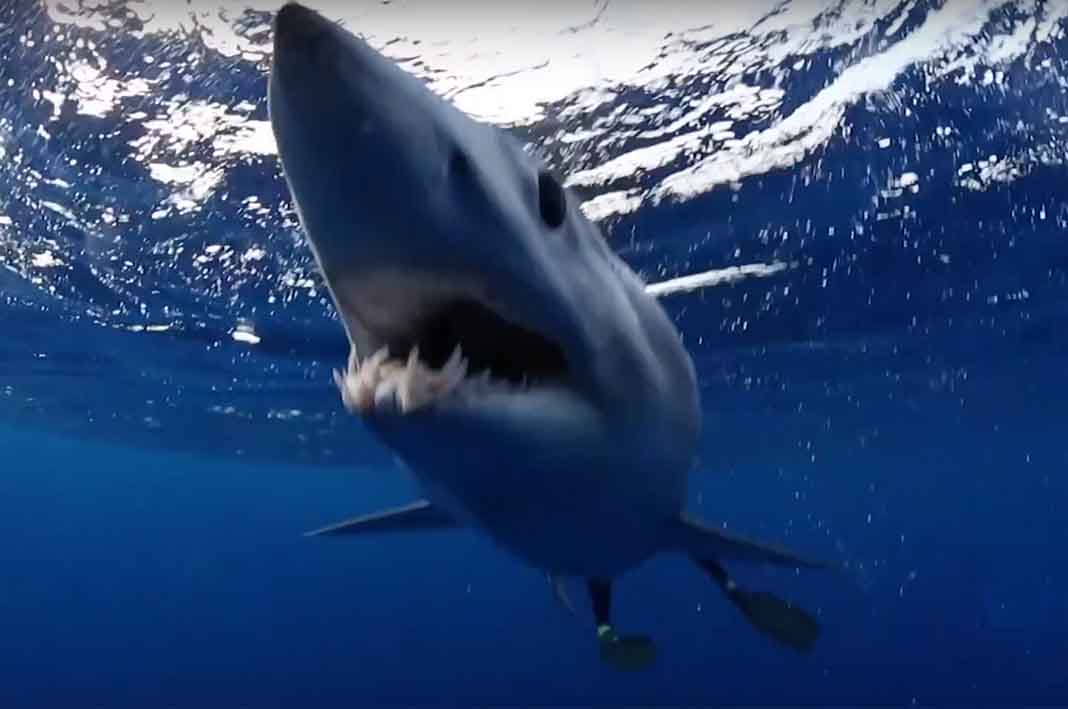The Author, Dr. Brad Wetherbee, is a Teaching Professor in the Department of Biological Sciences at the University of Rhode Island where he teaches introductory biology, marine biology, ecology, physiology and shark biology courses. His research interests span from biochemistry and physiology to movement ecology and management of marine resources, specifically sharks.
In anticipation of the rapidly approaching Shark Week, Dr. Wetherbee, along with IYRS which is sponsoring a shark week screening event, would like people to understand the importance of shark conservation:

The first thing that comes to mind for many people when they hear the word “shark” is an animal that will eat them if they happen to run into each other. Most people have no idea how few fatal shark attacks on humans there are around the world each year (about 10), or how many sharks are killed by humans each year (estimates as high as 100 million).
Most people are surprised to learn that as many as 70 million sharks are killed annually just for their fins. Some are unconcerned when they hear about the staggering numbers of shark deaths at the hands of humans because they view sharks as dangerous and consider the ocean a safer place with fewer sharks.
What most people don’t realize is that the level of shark fishing that occurs around the world is almost always done at unsustainable levels and that populations of sharks that are caught in fisheries are usually quickly overfished. Overfishing refers to removal of individuals from a population at a faster rate than reproduction is occurring, or in other words, sharks are being removed from the population more rapidly than they are reproducing.
However, when one considers characteristics that typify most species of sharks, the problem of declining shark populations is easy to understand. Similar to whales, sharks grow slowly, reach maturity at an advanced age and have relatively few offspring. The whaling industry made quick work of many species of whales and many whale populations are still recovering from over-exploitation more than a hundred years after peak whaling years. Many shark populations around the world have declined and are requiring decades to recover, even in situations where fishing pressure has been reduced, or species receive a great deal of protection.

Although it’s easy to convince people that it’s important to protect whales and we as a country decided nearly 50 years ago to protect all marine mammals through the Marine Mammal Protection Act, conservation of shark populations is a harder sell. Most people do not have a soft spot in their hearts for sharks compared to whales and dolphins, but sharks are important members of marine communities and an ocean without healthy shark populations is not a healthy ocean.
Every species in a community has a role in that community and is involved in interactions with other species. Sharks are no exception and in some cases play pivotal roles in maintaining the structure of marine communities. Consider the wide range of prey that are eaten by sharks, other species that prey upon sharks, remoras, cleaner fish and other parasites that interact with sharks, as well as the many community members that compete with sharks, and it’s easy to understand how removal of these animals can have wide spread effects on a community.

As top predators, many species of sharks have the important function of limiting the population size of their prey. There are many examples of the extensive effects that removal of large predators has had within communities on land and there is no reason to expect the case to be different in the ocean when top predator populations decline.
Conserving shark populations does not mean not catching or eating any sharks, but we must realize that there are some species that cannot be harvested in large numbers or else population declines will occur. Some species of fish grow quickly and produce millions of eggs each year and their populations can withstand fairly high fishing pressure. Even with these species, as is true for sharks, proper management of populations refers to not taking more than the population can tolerate, or in other words managing populations in a sustainable way. Conservation of sharks basically refers to proper management of their populations, which is a very desirable situation for a variety of reasons.
YOU’RE INVITED TO THE JULY 21 IYRS /COX MEDIA SHARK WEEK SCREENING EVENT ON THE IYRS CAMPUS AT 449 THAMES STREET, NEWPORT, RHODE ISLAND.
- 1:00pm – 3:00pm | IYRS Open House
- 3:30pm | Doors open for Shark Week Kickoff Party
- 3:30pm – 4:00pm | Music, mingling, popcorn, giveaways
- 4:00pm | 3 Minute IYRS Video + Welcome + Intro
- 4:15pm | Shark Week episode screening
- 5:00pm | Free giveaways & door prize raffle
- 5:00pm | Shark Expert: Dr. Wetherbee / URI graduate students
- 5:30pm | Event Ends
EVENT IS OPEN TO THE GENERAL PUBLIC ON A FIRST COME, FIRST SERVED BASIS.


